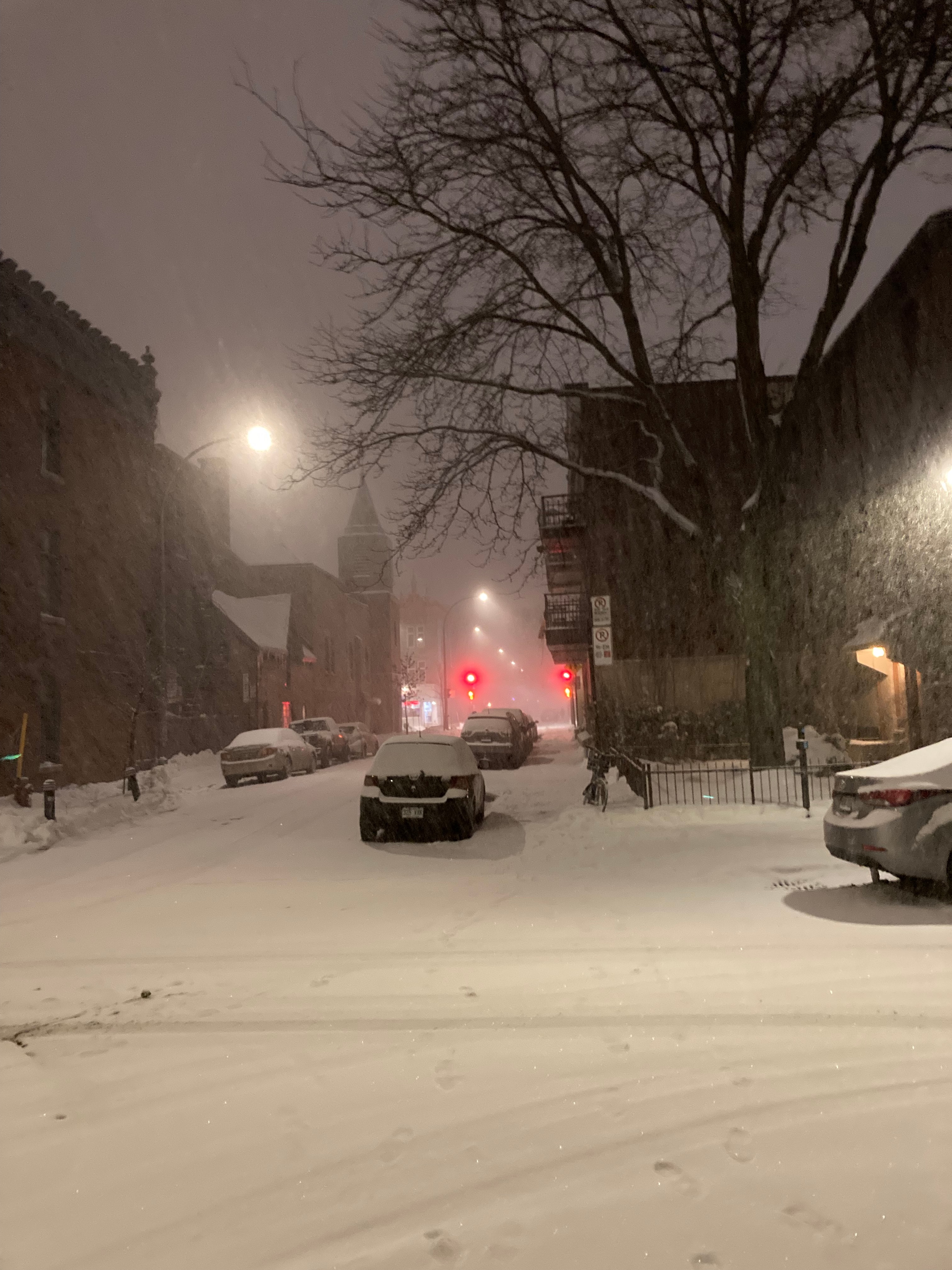Sludge Season
Lennie Roeber-Tsiongas
It’s a Tuesday in sludge season. No matter what time
of day, winter is committed to making sure you are always a little bit wet.
When you unlace your boots – the ones that scuff the spot on your ankle so it’s
red from November to April – your sock lands in a puddle of wet. It used to be
snow, but now it’s just wet. When you stop at the pharmacy to pick up eye drops
(winter gives you chronic styes) the heat blasts the cold right out of you. You
start to wonder how you were ever cold when there’s only ever been this heat
and the fuzzy crackle between the radio and store intercom. And wet, gray
footprints tracked into every aisle. Your lower back is wet, as is the place
where your messenger bag meets your hip. Sweating makes a seasonally
inappropriate appearance. When you reach back to unstick your shirt from the
wet, when your boots squeak on the tile – tracking your journey from the
entryway to the eye drops -- you resent that it is March and your eye is
swollen shut. These two facts can only be cause and effect.
Now you’re running to catch the 80; it’ll carry you deeper into the belly of winter. You think wistfully of hibernation, but you can’t trick your body into it, so you’ll always be awake for half of every day. A punishment of circadian proportions. Nat sent you the Marketplace listing and said you have to pick up the new vacuum. She’s gentle when reminding you that you owe her: remember how she’s been taking out the recycling, and that time your rent was two weeks late and she only told you she was put out about it afteryou’d finally paid. You met her in a Facebook group. She was looking for a room because she couldn’t stand to keep living with her ex-boyfriend. You met up in a café, where she ordered a black coffee, then changed her mind and got a flat white. The situation was classic. They were still living together post break-up. Neither of them could afford to move out. The relationship had evaporated, and now she was left with just the dregs. He never washed his silverware. She’d had enough. Now, the two of you share dishes, friends, and groceries. You find yourself wondering if you’d have ever met 30 years ago. Sometimes, you find her pubic hair stuck to your soap bar in the shower. To think she might have stayed a stranger.
The owner of the vacuum is named Vincent, and he’s quick to let you know it’s still available. You tell him you’re on the way, and then nestle into the bus seat and let your face fall against the glass, waiting for the cool to radiate up to your eye.
At the right latitude, you switch buses and drift towards Papineau, where the vacuum is waiting. The smell of manure drifts from the East, at its worst on March mornings. This bus is wet just like winter, and this time you aren’t lucky enough to snag a seat. You hover between a pair of hairy knuckles and a baby stroller, letting the window distort your swollen eye. Finally, Papineau.
![]()
![]()
Vincent emerges from the apartment as if from his own hibernation. He’s got dark hair and unkept facial scruff, rugged in a way that’s almost handsome. Sleep is crusted into the corners of his eyes and he smells unwashed and mannish; you can’t help but think of sex. His body heat mixes with the warmth from the apartment. He seems to have forgotten about the vacuum entirely, and stumbles, looking over his shoulder for it. You feel a flash of embarrassment for him, then something like smugness. Perhaps you make him nervous. You’re used to being pretty enough to make men nervous; you’ve forgotten the stye entirely. He asks if you’d like to step inside for a moment while he locates the vacuum that he claimed to have waiting for you. You agree, neglecting the rule about strangers and their musty apartments. It’s only when the door has fallen closed behind you – not entirely shut, but enough to block out the light – that you remember. You track wet into his apartment. The thin trails of gray sludge make you think of brain matter, your own brain leaking over his floor. He could do it, you know. But then, so could you. The threat of violence hovers over winter. You think of painting the snow.
His entryway doesn’t seem particularly dangerous; a few pairs of old boots with salt ripples marking the retreat of moisture. An IGA bag on a hook with a gaping maw full of other bags. Nothing to set fear aloft. Besides, he’s all over your phone. The app that brought you here would lead them straight to your body, dismembered, shoveled clumsily into a Pharmaprix bag. Maybe that knowledge is enough to make Vincent lower the hammer he’s holding in the other room where he’s looking for the vacuum. You remember the eye drops, rip open the package and administer them, your eye squinting in self-defense. A saline tear leaks between your nose and cheek and you think, if he is planning to kill you, this tear may work to your advantage. You can’t kill a girl while she has a stye, it just wouldn’t be right.
Vincent returns with the vacuum, and you give him $45 CAD. He opens the door; he seems eager for you to leave. You are almost disappointed. You strayed so obviously into danger; it seems unfair not to be punished for it. He shuts the door and you are back outside, struggling to lift the vacuum. You text Nat that you’re on your way home. It’s started to snow. It’s Tuesday, and winter is almost lovely.
![]()
Now you’re running to catch the 80; it’ll carry you deeper into the belly of winter. You think wistfully of hibernation, but you can’t trick your body into it, so you’ll always be awake for half of every day. A punishment of circadian proportions. Nat sent you the Marketplace listing and said you have to pick up the new vacuum. She’s gentle when reminding you that you owe her: remember how she’s been taking out the recycling, and that time your rent was two weeks late and she only told you she was put out about it afteryou’d finally paid. You met her in a Facebook group. She was looking for a room because she couldn’t stand to keep living with her ex-boyfriend. You met up in a café, where she ordered a black coffee, then changed her mind and got a flat white. The situation was classic. They were still living together post break-up. Neither of them could afford to move out. The relationship had evaporated, and now she was left with just the dregs. He never washed his silverware. She’d had enough. Now, the two of you share dishes, friends, and groceries. You find yourself wondering if you’d have ever met 30 years ago. Sometimes, you find her pubic hair stuck to your soap bar in the shower. To think she might have stayed a stranger.
The owner of the vacuum is named Vincent, and he’s quick to let you know it’s still available. You tell him you’re on the way, and then nestle into the bus seat and let your face fall against the glass, waiting for the cool to radiate up to your eye.
At the right latitude, you switch buses and drift towards Papineau, where the vacuum is waiting. The smell of manure drifts from the East, at its worst on March mornings. This bus is wet just like winter, and this time you aren’t lucky enough to snag a seat. You hover between a pair of hairy knuckles and a baby stroller, letting the window distort your swollen eye. Finally, Papineau.


Vincent emerges from the apartment as if from his own hibernation. He’s got dark hair and unkept facial scruff, rugged in a way that’s almost handsome. Sleep is crusted into the corners of his eyes and he smells unwashed and mannish; you can’t help but think of sex. His body heat mixes with the warmth from the apartment. He seems to have forgotten about the vacuum entirely, and stumbles, looking over his shoulder for it. You feel a flash of embarrassment for him, then something like smugness. Perhaps you make him nervous. You’re used to being pretty enough to make men nervous; you’ve forgotten the stye entirely. He asks if you’d like to step inside for a moment while he locates the vacuum that he claimed to have waiting for you. You agree, neglecting the rule about strangers and their musty apartments. It’s only when the door has fallen closed behind you – not entirely shut, but enough to block out the light – that you remember. You track wet into his apartment. The thin trails of gray sludge make you think of brain matter, your own brain leaking over his floor. He could do it, you know. But then, so could you. The threat of violence hovers over winter. You think of painting the snow.
His entryway doesn’t seem particularly dangerous; a few pairs of old boots with salt ripples marking the retreat of moisture. An IGA bag on a hook with a gaping maw full of other bags. Nothing to set fear aloft. Besides, he’s all over your phone. The app that brought you here would lead them straight to your body, dismembered, shoveled clumsily into a Pharmaprix bag. Maybe that knowledge is enough to make Vincent lower the hammer he’s holding in the other room where he’s looking for the vacuum. You remember the eye drops, rip open the package and administer them, your eye squinting in self-defense. A saline tear leaks between your nose and cheek and you think, if he is planning to kill you, this tear may work to your advantage. You can’t kill a girl while she has a stye, it just wouldn’t be right.
Vincent returns with the vacuum, and you give him $45 CAD. He opens the door; he seems eager for you to leave. You are almost disappointed. You strayed so obviously into danger; it seems unfair not to be punished for it. He shuts the door and you are back outside, struggling to lift the vacuum. You text Nat that you’re on your way home. It’s started to snow. It’s Tuesday, and winter is almost lovely.
